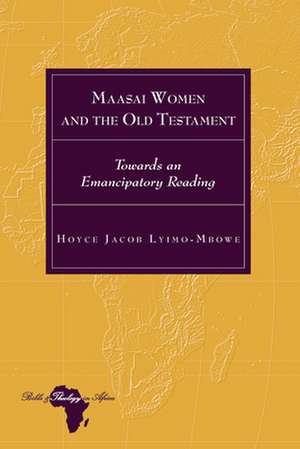Maasai Women and the Old Testament: Bible and Theology in Africa
Autor Hoyce Jacob Lyimo-Mboween Hardback – 27 aug 2020
Din seria Bible and Theology in Africa
- 27%
 Preț: 545.04 lei
Preț: 545.04 lei - 27%
 Preț: 682.16 lei
Preț: 682.16 lei - 23%
 Preț: 610.18 lei
Preț: 610.18 lei - 23%
 Preț: 652.03 lei
Preț: 652.03 lei - 27%
 Preț: 751.04 lei
Preț: 751.04 lei - 23%
 Preț: 617.15 lei
Preț: 617.15 lei - 9%
 Preț: 665.70 lei
Preț: 665.70 lei - 23%
 Preț: 644.60 lei
Preț: 644.60 lei - 23%
 Preț: 603.94 lei
Preț: 603.94 lei - 23%
 Preț: 663.16 lei
Preț: 663.16 lei - 23%
 Preț: 566.42 lei
Preț: 566.42 lei - 23%
 Preț: 607.07 lei
Preț: 607.07 lei - 23%
 Preț: 588.24 lei
Preț: 588.24 lei - 23%
 Preț: 641.35 lei
Preț: 641.35 lei - 23%
 Preț: 585.87 lei
Preț: 585.87 lei - 23%
 Preț: 627.26 lei
Preț: 627.26 lei - 23%
 Preț: 607.07 lei
Preț: 607.07 lei - 23%
 Preț: 605.90 lei
Preț: 605.90 lei - 23%
 Preț: 671.02 lei
Preț: 671.02 lei - 23%
 Preț: 690.73 lei
Preț: 690.73 lei - 9%
 Preț: 646.65 lei
Preț: 646.65 lei - 21%
 Preț: 338.12 lei
Preț: 338.12 lei
Preț: 644.60 lei
Preț vechi: 837.13 lei
-23% Nou
123.37€ • 128.45$ • 104.26£
Carte tipărită la comandă
Livrare economică 11-25 martie
Specificații
ISBN-10: 1433173492
Pagini: 226
Dimensiuni: 150 x 225 mm
Greutate: 0.49 kg
Editura: Peter Lang Copyright AG
Seria Bible and Theology in Africa
Notă biografică
Cuprins
Acknowledgements - List of Abbreviations - Introduction - Case Presentation - Research Problem - Aim of the Project - Methodology - Ethical Considerations - Who Are the Maasai? - Research Context -Summary - Bibliography and Reference to Informants - Theoretical Perspectives - Terminology Clarifi cation of Feminist and Womanist - Womanist Hermeneutics - African Womanist Biblical Hermeneutics - Examples of African Women Interpreting the Bible - Action Research - "Reading Other-Wise," "Ordinary Readers," and "Reading With" - The Enkitok Approach - Summary - Bibliography and Reference to Informants - Reading Four Old Testament Texts with Maasai Informants - Maasai Informants Interpreting Genesis 1:27 - Maasai Informants Interpreting 1 Samuel 1:1-28 - Maasai Informants Interpreting Exodus 21:10 and Deuteronomy 21:15-17 - Summary - Bibliography and Reference to Informants - Dialogical Hermeneutics: Critical Analysis of the Interpretation of the Old Testament with the Maasai Informants - Dialogical Analysis of Genesis 1:27 - Dialogical Analysis of 1 Samuel 1 - Dialogical Analysis of Exodus 21:10-11 - Dialogical Analysis of Deuteronomy 21:15-17 - Summary - Bibliography and Reference to Informants - Summary and Concluding Remarks - Bibliography and Reference to Informants - Index.
